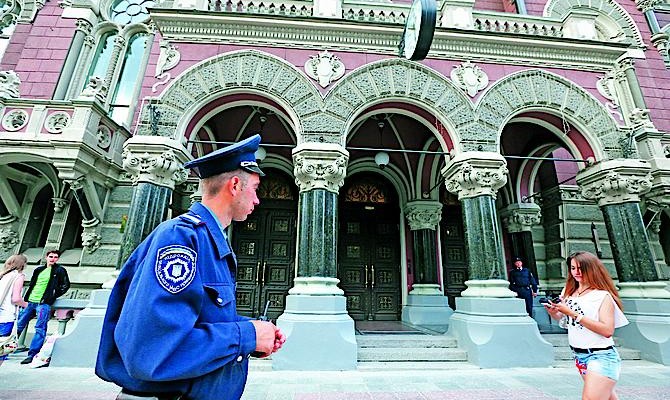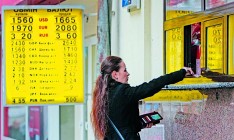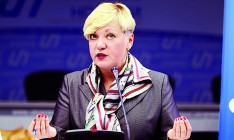Economy
public financeThe NBU turns on the money printing press to finance the government budget and refinance banks

The volume of Ukraine’s monetary base covering cash in circulation and reserves on accounts with the central bank increased by 11.7% or UAH 35.8 bn to UAH 342.9 bn in January – May compared to a 6.1% growth over the same period in 2013, while in 2012 this indicator decreased by 1.2%, according to the National Bank of Ukraine.
Head of the Analytical Department at Alfa-Bank Ukraine Oleksiy Blinov said this mainly due to the increase of cash in circulation, i.e. the withdrawal of money from bank accounts. In other words, this happened because Ukrainians largely withdrew money from their savings accounts under the influence of sudden devaluation of the national currency and a growing distrust towards the reliability of the country’s banking system. The regulator, however, made its own ‘contribution’ to the situation by using the mint to finance the government budget and refinance commercial banks that must counter the withdrawal of deposits.
To help the Finance Ministry
The demand factor forced the NBU to turn on the printing press, primarily in response to the increased demand for hryvnia deposit withdrawal, says Oleksandr Zholud, Senior Analyst at the International Centre for Policy Studies. The NBU spends part of the printed hryvnia for refinancing troubled banks, from which Ukrainians withdrew deposits most actively. Over five months the NBU provided UAH 104.8 bn to the banks for refinancing. Over the same period UAH 39.1 bn has been withdrawn from financial institutions.
“The NBU satisfied the demand for cash. Otherwise, the banks would have experienced shortage of funds for deposit withdrawals,” believes Zholud. Ukrainians withdrew their money from banks and their home savings to buy foreign currency – around UAH 46.7 bn or USD 4.9 bn and kept the rest for a rainy day. As a result, the volume of cash circulating on the market, not in banks, increased 20.6% over the first five months, although in 2013 this indicator grew 5.3% y-o-y and in 2012 – only 1.1%. As of the beginning of January, UAH 237.8 bn cash was circulating in the economy, while by the end of spring this amount increased by UAH 48.9 bn.
The other reason for printing money was to satisfy the government needs. As Capital wrote earlier, the NBU transferred UAH 19.8 bn to the general fund of the government budget instead of the planned UAH 5.7 bn or last year’s UAH 4 bn. This is 87% of the planned proceeds from the NBU to the government budget all done in just four months. The financial regulator thus ensured 18.6% of the proceeds to the government budget since the start of the year, although under the budget plan for the current year, its share in the annual revenues of the general fund is only 7.2%.
The NBU thereby helped the Finance Ministry ensure 100% fulfillment of the plan for this period. Finance Minister Oleksandr Shlapak admits that had the NBU transferred only 25% of the annual plan in January-April, the ministry would have to report 1% decrease of budget revenues compared to last year.
At that the revenues of the NBU, which must be transferred to the government budget based on the central bank’s financial statement and the Law On the National Bank of Ukraine, amounted to only UAH 11.9 bn last year. This means that anything above this amount, which is at least UAH 7.9 bn, came from printing hryvnia, says Vitaliy Vavryshchuk, Director of the Analytical Department at SP Advisory.
In addition to direct payments to the government budget, the NBU also financed the budget indirectly through purchase of domestic government bonds in the national currency, which Ukrainian experts have labeled “domestic quantitative easing” (QE). Since the start of the year, the regulator spent UAH 46.3 bn on government bonds. Its purchase of hryvnia government bonds peaked in February (UAH 19.3 bn) and was high in May (UAH 12.5 bn). Theoretically, neither advance payments to the budget nor purchase of government bonds by the NBU have direct influence on the volume of cash circulating in the public seeing as government budget revenues and expenditures were planned in advance, notes Zholud. Yet, factually, they gave the government a possibility to fulfill social expenditures, including paying wages to budget workers and pensions.
Not critical
For the moment, the volumes of hryvnia printed by the NBU are safe for the economy. “If the monetary base grows 15-20% per year for a long period, it forms an inflation potential, which transforms into higher price growth. However, if the growth rate does not exceed 15%, as it has been in Ukraine since 2009, printing money does not create additional risks for the economy,” explains Vavryshchuk. The results of January-April confirm that an increase in the cash volume does not stimulate a rise in consumer prices, agrees Zholud. At the moment, consumer price growth rates (4.6% for the period of five months) are even lower than the growth of monetary base (11.7%).
The International Monetary Fund currently strictly regulates the possibilities of increasing the monetary base for the NBU. The objective is to “guarantee that the growth of the monetary base corresponds to domestic price stability”, reads the memorandum of the IMF on the loan. Under its criteria, the volume of the monetary base at the end of the month should not have exceeded UAH 351.5 bn for Ukraine to be eligible to receive the second tranche of the IMF loan in the amount of USD 1.4 bn planned for July, which the NBU managed to do.
The possibility that the NBU will later increase the monetary base at a faster rate is rather low at the moment. In addition to that, Blinov believes that due to the factual termination of hryvnia circulation in Crimea, there is now an additional factor to limit an increase of the monetary base, which improves the probability that Ukraine will meet further guidelines of the IMF.






 of the agreement of syndication with Financial Times Limited are strictly prohibited. Use of materials which refers to France-Presse, Reuters, Interfax-Ukraine, Ukrainian News, UNIAN agencies is strictly prohibited. Materials marked
of the agreement of syndication with Financial Times Limited are strictly prohibited. Use of materials which refers to France-Presse, Reuters, Interfax-Ukraine, Ukrainian News, UNIAN agencies is strictly prohibited. Materials marked  are published as advertisements.
are published as advertisements.